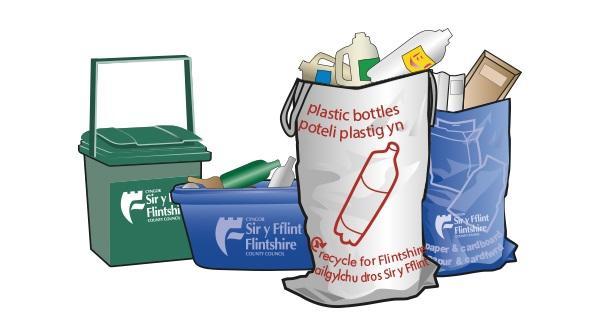CHANGES to bin collections in Flintshire are “critical” to meeting recycling targets, politicians have been told.
Flintshire Council is proposing a shake-up of its waste strategy after being threatened with a fine of around £1m for failing to met Welsh Government targets.
The devolved government currently expects local authorities to achieve a recycling rate of 64 per cent, a goal which Flintshire missed during the last two financial years.
Reduced black bin collections or storing rubbish in smaller containers are among the proposals outlined to improve recycling rates.
Councillors previously resisted a switch to three-weekly bin collections from the current fortnightly arrangement due to concerns over how it would impact residents.
However, with the government’s recycling target set to increase to 70 per cent for the next financial year, council officials have now said further measures are needed.
The warning was made despite reservations being expressed over some of the proposals at a meeting of backbench councillors to discuss the strategy on Tuesday (March 6, 2024).
Highlighting the council’s efforts to meet the target, Ruth Tulley, the authority’s regulatory services manager, said: “We’ve done door knocking exercises and we’ve provided information with regards to what can and can’t be recycled and what the expectation is.
“We ensured that people have the correct containers so that they can actually recycle in full.
“But what we haven’t seen is a significant behavioural change that has led us to be able to achieve the statutory recycling targets.
“One of the key aspects which we know makes significant change to that performance is the restriction of the residual waste collection.”
She added: “The strategy does require change to achieve those targets and that’s what we’re setting out here.
“That will be a key factor in consideration of the infraction fines as well, which obviously is still very much undecided at the moment.”
The council recently held a consultation on the strategy which received more than 5,300 responses.
While most people supported measures to improve recycling rates, views were split on plans to either reduce the frequency of collections or make black bins smaller.
Buckley Pentrobin councillor Mike Peers told members of the authority’s environment and economy scrutiny committee that not enough details had been provided on the proposals for him to support them.
He also said the changes would have a negative impact on people in the county who do recycle their waste properly.
He said: “When we look at recycling priorities, we’ve seen from the participation exercise that some people aren’t recycling.
“But for the people who recycle every week, with their blue bags, grey bags and bottle bins, they’re being targeted as well.
“Your proposals for restricted residual waste impact the very people who are recycling.”
He added: “The first bullet point on the consultation encourages greater recycling by either reducing the frequency of the collection, or the capacity of the bin.
“The report does not explain the rationale and how this will work. There are no costings and there’s no plan. Basically, it’s just an aspiration.”
The Welsh Government’s Minister for Climate Change has yet to decide whether to fine the council over its previous failures to meet targets.
Data published by the authority shows that 58 per cent of waste currently put in black bins by residents in Flintshire could be recycled.
In 2022/23, the figure equated to 13,410 tonnes of material that could have been recycled, of which just under half was food waste.
A further report will be presented to the committee in June outlining the council’s move to a “restricted capacity” waste collection service in more detail.


















